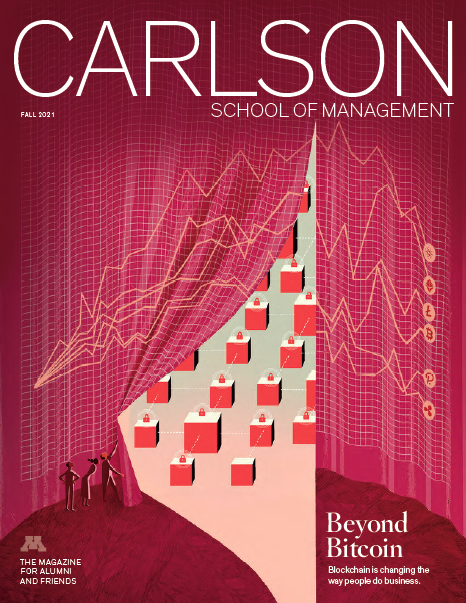
Preparing Leaders of Tomorrow
Friday, October 8, 2021
A Revamped Undergraduate Curriculum is Driving the Future of Business Education
BY MO PERRY
In 2006, Netflix was only mailing DVDs, there were no iPhones, and Hanson Hall was under construction. It also marks the last time the Carlson School of Management updated the core curriculum for its Bachelor of Science in Business degree. Things have changed. Beginning next fall (2022), so too will the curriculum for undergraduate students.
New courses, skills, and opportunities are now built-in, following a major redesign. Anchored around three realms—people and planet, data and technology, and critical thinking and problem solving—students will earn a degree that provides critical knowledge and experiences they need to enter today’s workforce and enhance their lives.
“Ultimately, we aim to develop graduates who are ready to deal with ambiguous problems on day one, and to evolve on day two,” says Vlad Griskevicius, associate dean of the Undergraduate Program. “Our new curriculum builds on a strong foundation to accomplish that. It meets the needs of today’s employers, and ensures our students become self-aware global leaders who are ready to use business as a force for good.”
Using the Academic Approach
Research papers begin with an explanation of the issues at play. The same approach was used for this curriculum redesign effort; it was led by two academics, after all. Griskevicius, who joined the Carlson School’s Marketing Department in 2008, partnered with Raj Singh, the former associate dean for the Undergraduate Program, to get the conversation about the curriculum started.
“When our graduates were hired, the employers sometimes came back to us and said, ‘They’re really bright, but they struggle to deal with ambiguity,’” says Griskevicius, who also applied his own insights based on seven years as Marketing Department chair. “The feedback we received was that our graduates would ask for the recipe to solve a problem, in cases where no recipe exists.” Upon reflection, Griskevicius realized the way students were taught was likely playing a role. “Students like clarity, so classes would give them steps for any given problem,” he explains. “They became good at following recipes, but got paralyzed without one.”

“Workers of the future need to learn how to learn, unlearn, and relearn, and be able to deal with uncertainty, complexity, and ambiguity.”
Soliciting Diverse Feedback
The curriculum review process included a 14-member committee of stakeholders from across the school. Feedback was gathered, via surveys and interviews, from more than 1,000 faculty, current students, alumni, and employers. Insights from job/industry data and reports, along with higher education trends, demographic trends, and school rankings were also used. An in-depth benchmarking against the top ten undergraduate business programs in the world, with an additional ten for calibration, led to additional direction.
Jack Boub, ’23 BSB, represented student voices on the committee. “I’m fortunate to be here during a time when the administration is ready and wants to make changes,” says Boub, who is a member of Business Board, the Carlson School’s undergraduate student government. “It opened the door for us to have a strong student voice in some changes that are actually going to happen.”
People and Planet
Preparing students to lead with purpose by incorporating diversity, equity, and inclusion (DEI) concepts and promoting sustainability and social responsibility frame this set of courses.
A new Race, Power, and Justice in Business course will emphasize historical perspectives of business in America, as well as systemic prejudices and equity considerations around modern tools, such as algorithms, which have been shown to have the potential to amplify human bias.
“This course will create a space for selfreflective conversations to help students learn from each other,” says Griskevicius, noting that most business curricula leave DEI education out of the classroom. “We, as a committee, wanted to make it more formal, not just leave it on the sidelines.” Through workshops and ongoing review of course content, the school is working to ensure all classes are inclusive and adhere to DEI principles.
Issues of corporate responsibility and sustainability will be emphasized in a revised ethics course. A career skills class will provide tools for career design and polishing skills for internships, and the Leading Self and Teams course builds interpersonal competency and leadership capacity. A new, pass/fail Design Your Life course aims to help students learn about their own identities, desires, and priorities, while building resilience and a growth mindset.
“It will encourage them to explore and make the most of their time in college, when they’re like kids in a candy store and can try out all these different things,” says Griskevicius. “It will help them make choices to not just thrive as business professionals, but also as human beings.”
Bringing all of these concepts together is the required international experience, which gives students life-changing opportunities to become culturally aware leaders with a global mindset.
Data and Technology
Increasingly, data-driven decisions are made at every level of business, in every industry. Whether students go on to specialize in data-specific fields or not, they must understand the impact the digital transformation is having on every industry. They’ll also be equipped with the tools to be a discerning consumer of data.
“Having systematic frameworks to understand how to use data in solving business problems is essential for all students, especially those who will be making data-driven decisions,” says Soumya Sen, associate professor of information and decision sciences and McKnight Presidential Fellow, who played a critical role on the committee in developing recommendations for necessary new data elements.
Adds Griskevicius, “Looking at the business landscape today, every graduate needs to have a comfort with data that was unheard of a generation ago.”
The redesigned curriculum will ensure that all students graduate with a proficiency in analyzing data. When a minor in analytics was added several years ago, the school saw greater-than-anticipated demand among students, almost half of whom added it. Further, students who graduated with the minor were hired at a salary premium of more than 20 percent. “Students are clamoring for it, because they see where the world is going,” notes Griskevicius.
Sen notes that, upon graduation, “our students will be able to ask the right questions, understand how to apply analytics to real problems, and know how different models work so they can effectively lead teams and organizations.”
Critical Thinking and Problem Solving
The World Economic Forum’s top 10 job skills for 2025 include critical thinking, creativity and originality, resilience and flexibility, and complex problem solving. “These are role-agnostic, industry-agnostic skills,” says Priya Priyadarshini, ’05 MHRIR, general manager of employee career and development at Microsoft and a committee member who was instrumental in framing the context for the future world of work. Priyadarshini is responsible for thousands of early career hires each year and believes “workers of the future need to learn how to learn, unlearn, and relearn, and be able to deal with uncertainty, complexity, and ambiguity.”
The new curriculum applies those skills head on: In the first year, a two-credit problem-solving lab will teach approaches to problem solving. In the second year, students will apply those lessons to a real-world business problem in the Impact Lab Project, where they will have the opportunity to disaggregate the issues involved, generate data-driven solutions, and present recommendations to their client partner.
“This is a game-changer,” says Griskevicius. “We’re the first to try this and give all our students real-world practice so they’re ready to hit the ground running.”
Revisiting I-Core
Finally, the revised curriculum builds on the school’s popular courses known as I-Core, expanding from a single semester to a full year. In their second year, students will be cohorted into classes that represent each of Carlson’s seven departments, culminating in the Impact Lab Project.
“Looking at the business landscape today, every graduate needs to have a comfort with data that was unheard of a generation ago.”
“I-Core is the focal point of Carlson, and a huge selling point,” notes Boub. “It’s a comprehensive learning experience, but there are gaps. We pushed for including more in I-Core because it occurs so early, before students declare a major, and there’s still time to decide what you want to do.”
